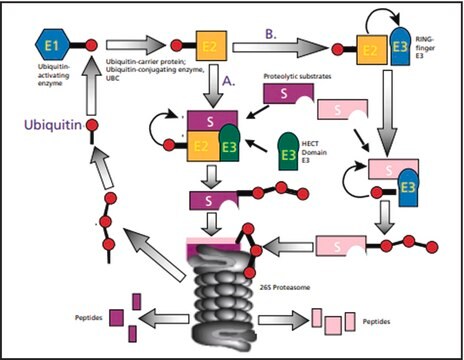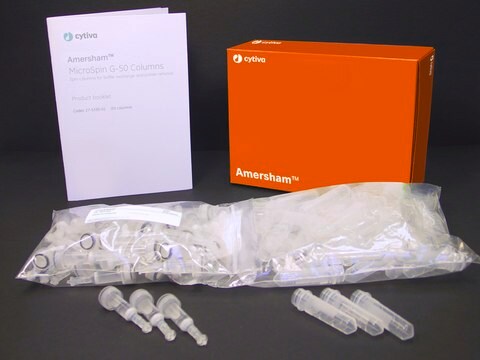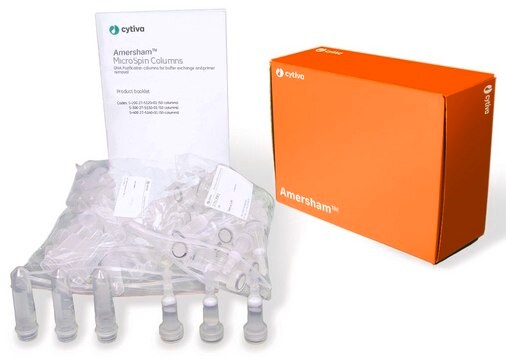Recommended Products
form
saline suspension
Quality Level
extent of labeling
7-15 mg per mL
technique(s)
affinity chromatography: suitable
matrix
Fast flow highly cross-linked 4% beaded agarose
matrix spacer
6 carbon
storage temp.
2-8°C
Application
Ubiquitin-agarose is used in affinity chromatography, protein chromatography, intracellular protein degradation, calpain and lysosomal proteases, proteomics, specialty resins and ubiquitination analysis. Ubiquitin-agarose has been used in a study to produce evidence for a particulate location of ubiquitin conjugates and ubiquitin-conjugating enzymes in the rabbit brain. Ubiquitin-agarose has also been used to study fertilization of the ascidian, Halocynthia roretzi.
Physical form
Suspension in 1 M NaCl containing 15 Mm Sodium azide.
Storage Class
10 - Combustible liquids
wgk_germany
WGK 3
flash_point_f
Not applicable
flash_point_c
Not applicable
ppe
Eyeshields, Gloves
Certificates of Analysis (COA)
Search for Certificates of Analysis (COA) by entering the products Lot/Batch Number. Lot and Batch Numbers can be found on a product’s label following the words ‘Lot’ or ‘Batch’.
Already Own This Product?
Find documentation for the products that you have recently purchased in the Document Library.
Shin-Chung Kang et al.
The Journal of pathology, 203(1), 603-608 (2004-04-20)
Although the key event in the pathology of prion diseases is thought to be the conversion of cellular prion protein (PrP(C)) to the protease-resistant scrapie species termed PrP(Sc), the factors that contribute to neurodegeneration in scrapie-infected animals are poorly understood.
Anjali Joshi et al.
Traffic (Copenhagen, Denmark), 9(11), 1972-1983 (2008-09-27)
Retroviral Gag polyprotein precursors are both necessary and sufficient for the assembly and release of virus-like particles (VLPs) from infected cells. It is well established that small Gag-encoded motifs, known as late domains, promote particle release by interacting with components
Hyoung Tae Kim et al.
Methods in molecular biology (Clifton, N.J.), 832, 639-652 (2012-02-22)
The biological role and fates of ubiquitin (Ub) conjugates are determined by the nature of the ubiquitin chain formed on the protein. Recently, we reported that Ring-finger and U-box ubiquitin ligases (E3s), when functioning with different E2s, synthesize different types
M Hoefer et al.
FEBS letters, 289(1), 54-58 (1991-09-02)
Ubiquitin-activating enzyme was purified from the yeast Saccharomyces cerevisiae by covalent affinity chromatography on ubiquitin-Sepharose followed by HPLC anion-exchange chromatography. Enzyme activity was monitored by the ubiquitin-dependent ATP: 32PPi exchange assay. The purified enzyme has a specific activity of 1.5
M Majetschak et al.
European journal of biochemistry, 255(2), 482-491 (1998-08-26)
Ubiquitin is often implicated as a specific tag for protein degradation via the ubiquitin system although only a limited number of physiological proteins have been shown to be degraded in their native tissues via this pathway in vivo. Ubiquitin may
Our team of scientists has experience in all areas of research including Life Science, Material Science, Chemical Synthesis, Chromatography, Analytical and many others.
Contact Technical Service






